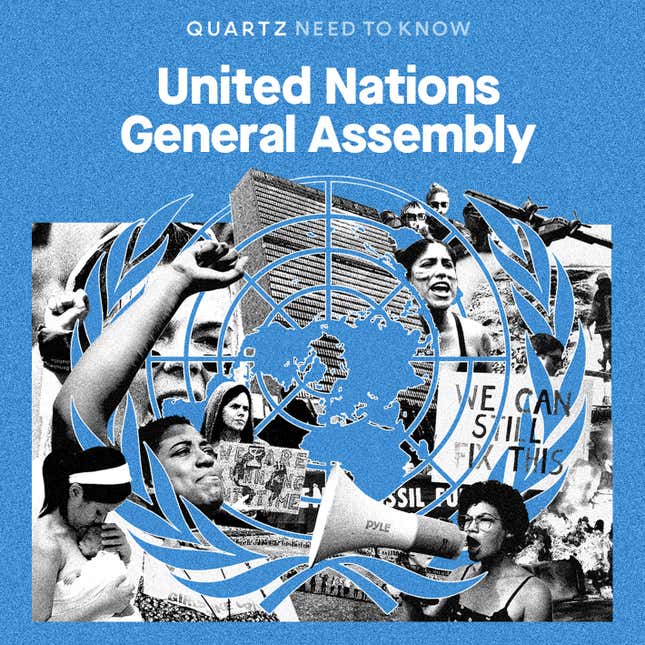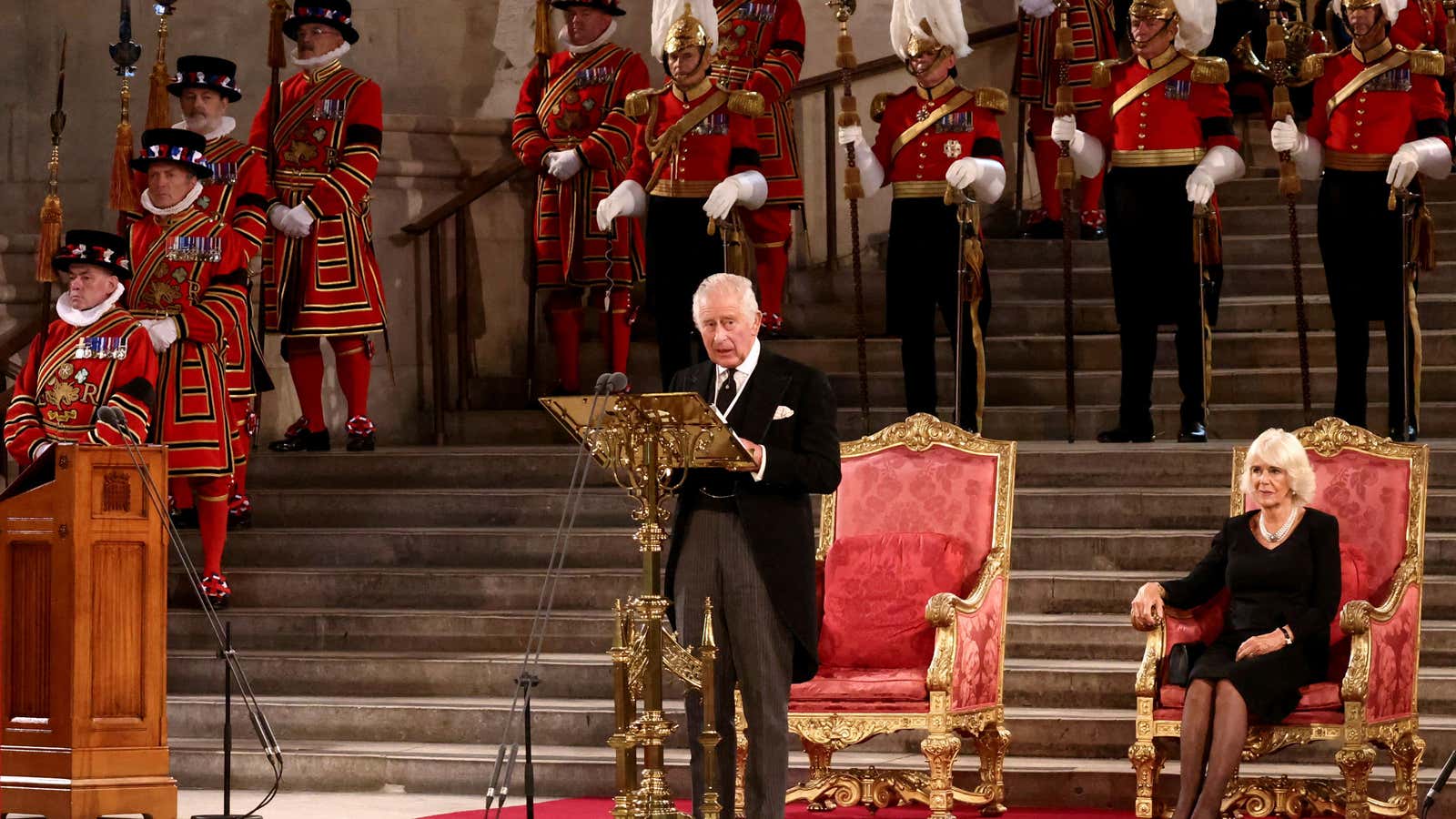Good morning, Quartz readers!
Here’s what you need to know
King Charles III addressed UK parliament for the first time. The new monarch emphasized the importance of parliamentary democracy. Meanwhile, New Zealand’s prime minister Jacinda Ardern stated she expects her country to one day be a republic.
The UK economy grew slower than expected. GDP rose 0.2% in July, less than the 0.3% analysts predicted, as rising prices and recession fears weigh on consumer spending.
The EU approved Pfizer’s omicron booster. The vaccine targets two of the latest variants. Japan has also cleared Pfizer and Moderna boosters, and reportedly plans to ease travel restrictions for tourists this fall.
Sweden’s right wing is on course to secure a narrow win. Final election results are not expected until Wednesday, but the bloc is on track for a one-seat majority.
Universal Studios Beijing cut staff. A two-month closure and China’s zero-covid policy has led to an approximate 25% drop in its workforce since opening.
Former Czech prime minister Andrej Babis stood trial. The billionaire, who may run for president, is allegedly involved in EU subsidy fraud worth $2 million.
Africa’s first hydrogen plant is expected to start up in 2024. France’s HDF Energy stated the plant, located in Namibia, will be able to produce clean energy for 142,000 people.
What to watch for
Peiter “Mudge” Zatko, the former Twitter security chief, filed a federal whistleblower complaint against his ex-employer in August. Today, Zatko will be grilled by US senators on the substance of his complaint, which largely alleges failures and deception related to the social media platform’s security and data privacy.
Expect lawmakers to ask Zatko for evidence of his claims that: Twitter violated its 2011 consent decree with the US Federal Trade Commission over data privacy, gave a significant chunk of employees system-level controls, and that the Indian government embedded an agent in the company’s ranks.
Zatko’s testimony will reveal more about whether he’s simply a disgruntled employee or a full-fledged whistleblower unearthing major wrongdoing. And in an interesting twist, the whole ordeal factors into a whole other ordeal: Twitter’s forthcoming trial with Elon Musk.
How to build a space station
Crypto pioneer Jed McCaleb, the original founder of Mt. Gox, and an early developer of Ripple, has founded a new company called Vast that aims to build space stations with artificial gravity. As the International Space Station orbits retirement and NASA shifts its focus to the Moon and beyond, a handful of companies are raising money and mocking up plans for private habitats in low-earth orbit, but it’s a high-risk business plan.
1️⃣ Despite Elon Musk’s SpaceX lowering costs for getting necessary materials into space, building an entire space station will cost at least a cool billion.
2️⃣ Vast is committed to figuring out artificial gravity for its habitat, but it’s not clear exactly how that would work.
3️⃣ Will there be enough demand from corporations, governments, or just obscenely rich individuals to set up shop 500 miles above Earth?
It’s UNGA time!

The 77th session of the United Nations General Assembly begins today, in all of its politicking, speechmaking, canapé tasting, language interpreting, midtown Manhattan traffic-snarling glory.
Want some help navigating the implications of what’s said—and what’s not said—at UNGA? Quartz will be there to help you make sense of how the world is pacing against the UN’s sustainable development goals and fill you in on what’s happening at the sideline events.
Hit the button below to sign up for our Need to Know: UNGA 2022 limited series newsletter, and we’ll update you a few times a week.
Quartz’s most popular
🛢️ Russia is offering further oil discounts to India
💵 The US dollar has gotten stronger. Here’s how other countries are responding
🏛️ An Anil Ambani company has sued an Adani firm for $1.7 billion
🍃 Clean energy now employs more people than fossil fuels
🤔 African leaders are questioning financial policies like microcredit that exclude women
🛍️ Versace is the latest luxury brand to increase prices
Surprising discoveries
Air pollution causes cancer, but not in the way you think. Rather than damaging cells, toxic fumes awaken old damaged cells—a discovery that could revolutionize tumor prevention and treatment.
Utah’s Great Salt Lake is getting smaller and saltier. Salinity has increased by 18%, which isn’t good for local wildlife’s survival.
Disposing of dead whales is bad for the environment. Removing the carcass rather than letting it decay naturally, which provides food for everything from scavengers to bacteria, impoverishes the circle of life.
Applications to mortuary school are booming in the US. As the $16 billion funeral services industry faces a critical shortage of workers, students have a 90% job placement rate upon graduation.
Cockatoos in Australia learned how to remove a brick to open a wheelie bin. We acknowledge the first four Surprising Discoveries are rather bleak, so here’s some news about animals being clever.
Our best wishes for a productive day. Send any news, comments, mortuary science degrees, and dumpster-diving parrots to [email protected]. Reader support makes Quartz available to all—become a member. Today’s Daily Brief was brought to you by Sofia Lotto Persio, Julia Malleck, Morgan Haefner, Scott Nover, and Susan Howson.
